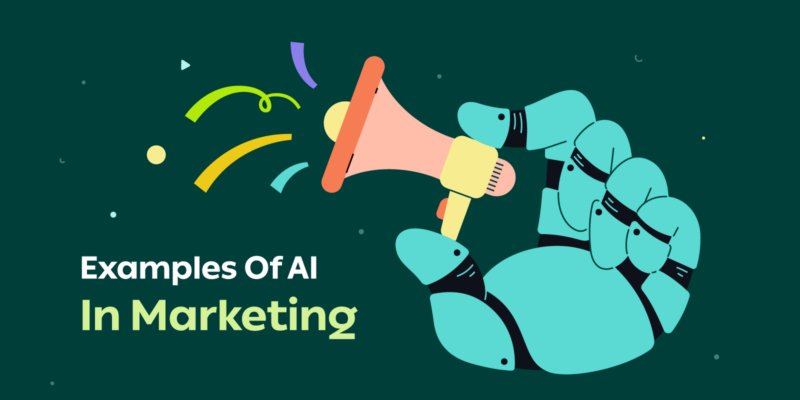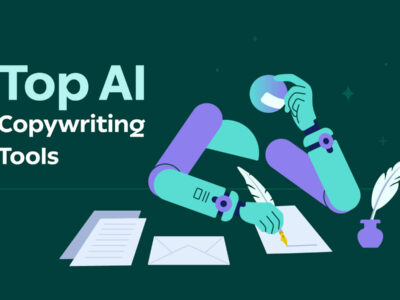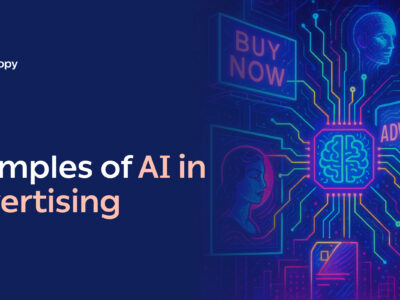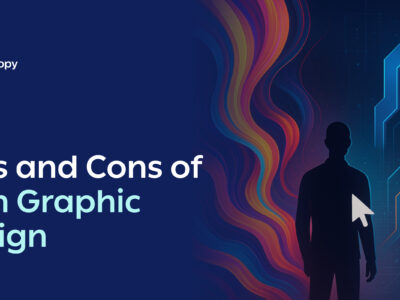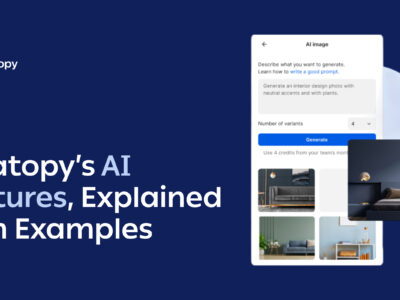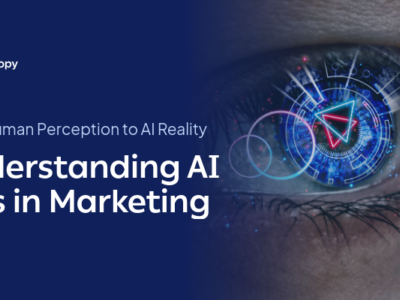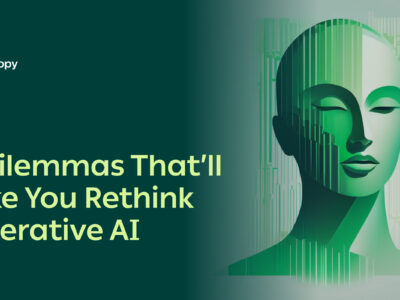AI is the superstar of the moment. No doubt about it. And marketing is definitely one of the areas where AI can fully unfold and showcase its incredible potential.
From generative AI to automation, optimization, and customization, marketers are using AI tools to create innovative campaigns, engage audiences in new ways, and cut costs.
A recent report found that as many as 61.4% of marketers have used AI in their marketing activities so far.
If you’re looking for ways to integrate AI, we’ll make it easier for you to understand how to use AI for marketing purposes.
We’ve curated some of the best use cases of AI in marketing to help you figure out you leverage it and maybe spark some fresh ideas.
A. How is AI used in marketing?
B. 9 examples of AI in marketing
C. The benefits of AI in marketing
A. How Is AI Used in Marketing?
You may be asking yourself, “How are all those 61.4% marketers using AI in marketing?” or “Do they know something I don’t?”.
Before we get into the AI in marketing examples, I believe it would be useful to list out the applications of AI in marketing.
- Content generation. One of the earliest use cases of AI in marketing was generative AI. Using AI tools to generate content or images, marketing teams reduce production time while increasing quality. Specifically, generative AI can be used to generate ad creatives, blog posts and social media content, and engaging video content.
- SEO optimization. AI SEO tools are used to perform keyword research and competitive analysis, write SEO-optimized articles, and provide any type of SEO-related advice.
- Marketing automation. Marketers use AI-powered tools to automate and customize every aspect of their marketing campaigns, from personalized messages to audience targeting and bidding.
- Predictive customer behavior. Using machine learning technology, AI is able to predict a customer’s journey and actions and adjust messages accordingly.
- Programmatic advertising & dynamic pricing. Machine learning AI algorithms allow programmatic advertising to optimize the personalization of ads, content matching, adjust bidding in real-time, and provide predictive insights. AI is also used for dynamic pricing, a strategy that allows retailers to change prices several times a day, depending on various factors like availability and competition.
- Email automation. Automated email campaigns are used to map out customer journeys and nurture them according to their stage in the sales funnel by sending personalized emails based on their actions and interactions.
- Personalized customer care. Chatbots and virtual assistants can offer instant personalized customer care. AI bots can take in inquiries and answer questions about prices, product features, and availability. More complex AI chatbots can even identify potential customers who are most likely to convert and engage them with personalized messages and offers.
- Lead management. Sales teams use lead scoring and nurturing AI tools to process leads automatically. AI can automate lead scoring and nurturing by analyzing data to identify which prospects are most likely to convert into customers.
- Social media. Generative AI writing tools help busy social media managers get their social posts ready for publishing. Other AI social tools are specialized in social listening and sentiment analysis.
- Productivity. There are AI marketing productivity tools that can automatically record and transcribe meetings and summarize ideas and actions to take. Tools like AI video transcription services can convert lengthy video meetings into searchable, structured text, enabling teams to easily reference discussions.
B. 9 Examples of AI in Marketing
Now, let’s get inspired by the big brands using AI for marketing.
1. LEGO
LEGO was the first toy retailer to introduce an ecommerce chatbot. Back in 2016, during Christmas time, LEGO rolled out Ralph, a friendly bot for Messenger.
LEGO’s goal was to increase online sales, so they needed a way to offer gift recommendations around Christmas. The solution they found in partnership with Edelman, their creative agency, was to create a unique Messenger bot for the 2017 Christmas season.
This is how Ralph, the LEGO bot, was born. Ralph came to life with one mission: to enhance the digital shopping experience by helping people choose and buy the perfect gift for their dear ones.
So, whenever someone typed in a query, Ralph was there to guide them through and make personalized gift recommendations. It started by segmenting the user into categories, including region, age, budget, and interests of the person receiving the gift. This data helped Ralph to narrow down the options and provide personalized gift recommendations.
Not only was Ralph extremely helpful, but also very friendly and charming. He used phrases like “Oh, my bolts!” while collecting customer information.
LEGO also ran Click-to-Messenger ads to people over 25 in the U.S., UK, France and Germany. Another segment of the audience that LEGO targeted was people with an interest in LEGO or toys. The last targeted group was people who visited the LEGO website in the past 2 weeks prior to the start of the campaign.
Ralph, the friendly and helpful bot, scored some incredible results:
- 340% increase in return on ad spend for Click-to-Messenger ads;
- 71% reduction in cost per conversion;
- 25% of all social media sales.
Because the campaign was a huge success, LEGO has since decided to make the chatbot available all year round and expand its geographical reach.
2. Nutella Unica
Nutella’s manufacturer, Ferrero, teamed up with Ogilvy and Matter Italia to create Nutella Unica, a campaign that targeted Italians, aiming to offer unique customer experiences and increase brand bonding.
An AI algorithm was developed to create seven million different packages for the Nutella jars. Each jar was unique in graphic patterns and colors to match various customer preferences.
The labels displayed different combinations of colors, shapes, lines, polka dots, zigzags, and other art-inspired patterns. The campaign was launched in Italian supermarkets and was promoted online and on TV.
The results: all 7 million Nutella Unica jars were sold out within one month.
3. Heinz
Heinz leveraged AI’s text-to-image capabilities to create the “What does AI think ketchup looks like?”.
The company used OpenAI’s DALL-E to generate images picturing what AI thinks ketchup is. The results surprised everyone, as the AI design tool created illustrations using the Heinz bottle and, even more incredible, the Heinz label.
Heinz fans were also involved in the campaign and asked to share their suggestions for ketchup prompts. The best-generated images were posted on the brand’s social media pages and even turned into print ads.
These generative AI examples only confirmed what the brand already knew based on insights: the Heinz brand is synonymous with the word ketchup.
4. Coca-Cola
Coca-Cola joined the AI revolution and even launched its own AI platform. Built exclusively for Coca-Cola by OpenAI and Bain & Company, the Create Real Magic platform was the first of its kind to combine the text-generative capabilities of GPT-4 and DALL-E’s text-to-image software.
The campaign covered the United States, Australia, and select countries from Europe and offered artists the chance to create AI Coca-Cola images. Selected artists got their creations featured on the brand’s digital billboards in New York’s Times Square and London’s Piccadilly Circus.
The Create Real Magic campaign allowed artists to get access to the brand’s iconic symbols from Coke’s advertising archive, like the Coca-Cola Santa Claus and Polar Bear.
Following the campaign, a group of 30 creators was selected to travel to the Coca-Cola headquarters in Atlanta for the “Real Magic Creative Academy,” a three-day workshop run by Coke’s Global Design and Creative teams in partnership with OpenAI.
The company promised the content they produced could be used for Coca-Cola licensed merchandising and digital collectibles.
As a result, the company is further set to explore ways of leveraging AI beyond marketing, from internal management to customer service, ordering, and point-of-sale material creation.
5. David Beckham
Malaria No More, a global NGO on a mission to eradicate malaria, hired David Beckham and Synthesia, an AI video platform, to raise awareness and increase donations to eradicate malaria.
Using Synthesia’s cutting-edge AI video technology, they allowed malaria survivors to speak through David Beckham’s, each one of them in their native language.
In the campaign’s main video, David Beckham speaks nine languages to get leaders from the developing world to act on fighting this disease.
The Power of Voice campaign resulted in:
- Thousands of people joined to support the cause by adding their voices;
- $14 billion of dollars in donations to fight malaria, AIDS, and tuberculosis;
- 6 awards from some of the world’s biggest advertising festivals for the social good campaign;
- 6 more nominations for other awards.
6. Booking.com
Booking.com has recently rolled out an AI Trip Planner service for U.S. users only, answering questions and helping customers plan their trips.
AI Trip Planner is a revolutionary chatbot that combines ChatGPT’s language model with Booking.com’s machine learning algorithms to solve all customer queries and provide personalized itineraries.
People can ask the AI Trip Planner questions about travel, as well as more specific queries regarding destinations, and accommodation options, providing travel inspiration based on the user’s needs. The chatbot also provides travel itineraries for a particular city, country, or region.
The service is available to U.S. English-speaking users in the Booking.com app, but the travel platform promises that Trip Planner will soon be available for everyone.
7. Hardee’s
Another way businesses use AI in marketing is through social listening. And I’m sure you will start using it as soon as you finish reading how Hardee’s used AI social listening to turn an incident into a business opportunity.
It was September 13th, 2022, when the CEO of a pillow manufacturing company got their smartphone confiscated in the parking of a Hardee’s restaurant. The event quickly made news on Twitter (now X) which caused Brent Waible, the Senior Media Manager at CKE Restaurants, the company that owns Hardee’s, to receive a notification on his phone. It was a spike alert from Emplifi, a social media marketing platform, informing him that Hardee’s has been mentioned on Twitter.
With Emplifi’s social listening tool turned on and real-time insights into the situation, the team at Hardee’s was able to quickly put together a plan and leverage the incident to their advantage.
So, in the morning, they tweeted:
Now that you know we exist… you should really try our pillowy biscuits.
— Hardee’s (@Hardees) September 14, 2022
As a result of this Tweet:
- Hardee’s grew its followers base to 8k;
- They recorded +8 million impressions;
- They had 18 million retweets.
But they didn’t stop there. They wanted to make the most of the event by inviting people from Twitter to their restaurants. So they came up with a second tweet to turn all that engagement into real action. Here’s what the tweet said:
If you still have a phone, get a free breakfast biscuit in our app for My Rewards members: https://t.co/rk896CKmpc https://t.co/loaIAFVViS
— Hardee’s (@Hardees) September 14, 2022
This tweet resulted in the following:
- An increase in Hardee’s app downloads;
- An increase in foot traffic to the restaurants.
Nice use of social listening, wouldn’t you agree?
8. Monday.com
Among the numerous applications of AI in marketing, search engine optimization is one of the most common used nowadays.
SEO may not be as exciting as advertising, but it surely contributes a great deal to a company’s growthI.
So I wanted to show you what an AI SEO tool can do for a business.
Monday.com, the popular project management software, hired MarketMuse and Codeless to help them improve their rankings, increase organic site traffic and reduce paid search spend.
As a project management tool, Monday.com has a broad audience, being used by teams in all sorts of industries. So, the challenge for MarketMuse and Codeless was to identify the different groups of audience, and build customized content-driven customer journeys.
Codeless is a content agency that produced over 500 articles for Monday.com. MarketMuse is an AI content optimization tool that ensured all of the articles were effectively optimized for search engines.
The campaign spanned five months, and these are the results:
- 500 articles were published, 100 per month;
- A 25-position average rank improvement;
- 1.570% increase in organic blog traffic;
- 10 out of 100 posts on page 1 of Google for their focus topic.
9. Amazon
We cannot end this list of artificial intelligence examples without mentioning Amazon.

Amazon has pioneered machine learning technology for personalization for the last two decades, delivering highly customized customer experiences, from product recommendations to dynamic pricing.
As a matter of fact, a study found that 35% of all Amazon purchases come from product recommendations.
But now, the giant retailer takes things to a whole new level, using a feature called Personalize to analize customer data and provide even more personalized experiences.
This tool is a fully managed AI service that employs deep learning to analyze customer data and predictive analytics to generate item recommendations and unique experiences.
Moreover, Amazon made their Personalize feature generally available through their Amazon Web Services, so any company can use it to build and deliver peronalized experiences.
Amazon Personalize automatically processes your data, identifies what is meaningful, and builds a personalized model unique to your business to deliver custom content across channels and devices.
Specifically, this AI tool can be used to build personalized video streaming, product recommendations, personalized emails, targeted marketing campaigns, and personalized search results.
C. The Benefits of AI in Marketing
These examples of artificial intelligence in marketing only confirm what we all guessed: AI can substantially contribute to improving a business’s overall results.
There are multiple advantages to integrating AI in marketing. For example, QuantumBlack’s study on AI found that 41% of marketers saw a decrease in costs after their companies adopted AI into their work process. And 65% of marketers saw a big increase in revenue due to integrating AI into their systems.
Let’s break down all the benefits of AI in marketing:
- Save time by streamlining processes
- Make data-driven decisions
- Improve efficiency and productivity
- Offer unique and personalized customer experiences
- Optimize content for search engines
- Provide personalized customer assistance
Final Thoughts
As we’ve seen from these companies using AI for marketing, artificial intelligence can massively contribute to a business’ marketing efforts.
You can now use AI tools for marketing to engage audiences in surprising new ways, optimize content for search engines like never before, increase sales through highly targeted ad campaigns, or offer personalized human-like customer assistance with the help of intelligent bots.
Now it’s the perfect time to adopt artificial intelligence into your marketing processes and ride the AI wave.

